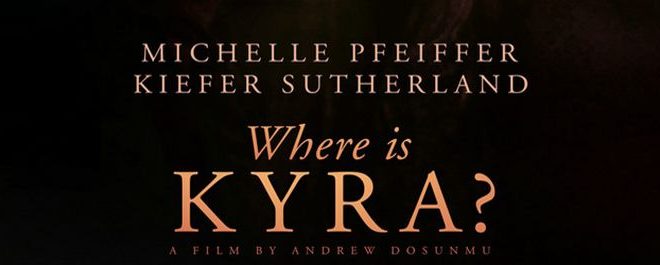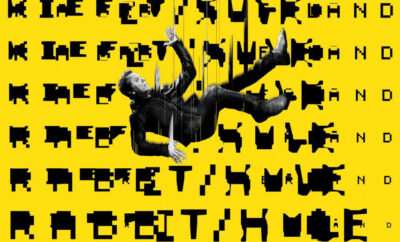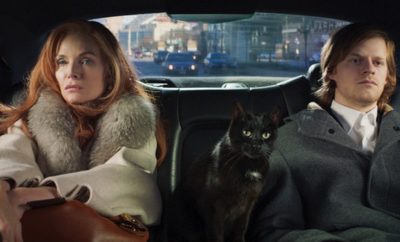
Movie Reviews
Where is Kyra?
By: Taylor Gates
Growing up a fan of musicals, I was always mesmerized by Michelle Pfieffer. From cool rider-seeking Stephanie in Grease 2 to mean queen Velma Von Tussle in 2007’s Hairspray, she always seemed to shine in vibrant movies playing showy roles. Where is Kyra? is not a vibrant movie and Kyra is not a showy role. In fact, they’re about as opposite as you can get—the film is bleak and moody, the character rather mousy. But rest assured, Pfieffer is still as magnetic and enigmatic as ever, proving her range and authenticity while carrying a risky plot to compelling places. Forced to rely primarily on body language and facial expressions, her performance is subtle, layered and just plain masterful.
The movie begins with unemployed and unlucky Kyra (Pfieffer) caring for her elderly mother (Suzanne Shepherd) in a cramped New York City apartment. When her mother eventually passes away; however, she is left with not only grief but a pile of bills and no income, too. After exhausting all of her options—selling furniture, going on countless job interviews, and passing out fliers on the street to name a few—Kyra decides to do the unthinkable. Because there was a mixup regarding her mother’s social security number, her death has not yet registered in the system so Kyra begins impersonating her deceased mother in order to cash her pension checks.
The film’s concept unfolds in a way akin to psychological dilemmas like the trolley problem or Milgram experiment—simple on the surface, but much more complex once more factors start coming to light. Everything that happens before the title card feels almost like its own twenty-minute short film showing a typical day of Kyra taking care of her mother. The pace crawls along and, yes, it can feel tedious at times, but that’s the point. It forces you to feel the frustration, the mundaneness of Kyra’s life. It also makes it difficult not to root for her. Kyra’s relationship with her mother is vulnerable and touching. She clearly loves her mom, which makes her decision to pose as her for money all the more distributing and complicated.
Kyra’s desperation is a big part of what saves her from being unlikable. The same can be said for Doug (Kiefer Sutherland), Kyra’s devoted yet equally hapless boyfriend. You pity the characters’ situations, but they aren’t inherently pitiful people. Because of this, it’s easy to feel sorry for them even when they do illegal, twisted things. Kyra doesn’t impersonate her deceased mother to get rich – she does it so she’s not homeless. She doesn’t ask her ex-husband and his pregnant wife for a loan to cause drama. She just wants to put food on the table. She doesn’t lie to her boyfriend because she’s selfish or manipulative. She simply wants to protect him.
It’s easy to believe that Kyra’s outrageous ends justify her means, and that’s a testament to the understated direction by Andrew Dosunmu (Mother of George). The film was written by Darci Picoult and is based on a story by Picoult and Dosunm. The actual dialogue is sparse and when tense conversation do happen, they usually simmer at low volume. Other sounds are skillfully employed; the city’s background noise both sets the tone of various scenes and emerges like a character all its own.
It’s a soundtrack of dissonance and rhythms, creating a sense of uneasy mechanicalness—screeching trains, a cane on the pavement, a jump rope. At one point, the soft, steady flow of an oxygen tank is replaced by true silence. It’s a quiet beast of a movie.
The set design and cinematography are woven in expertly. Everything looks old and worn, from a creaky wooden cabinet to a faded knitted blanket limply slung on the back of a couch. The interiors are dull browns, the exterior dreary grays. Whenever there’s a hint of sunlight and blue sky, the camera gets blurry. Sunshine doesn’t exist in Kyra’s world.
The camerawork is still and steady, eerily so. There are no sharp movements—only slow zoom-ins. The shots are either so close up that it’s unnerving or so far from the characters it’s lonely, both of which are incredibly raw. The unflinchingly tight shots make it feel like you’re observing these characters under a microscope. They’re bugs pinned inside a glass box, helplessly squirming around and exposed.
Where is Kyra? is hard to define, enveloping so many genres at once. At its core it’s a character-driven drama, but in some ways it’s also a mysterious procedural, a psychological thriller and a horror—the monster being the complete tragedy and despair of poverty. The thing that makes Where is Kyra work is its cohesiveness. All the pieces that make up the film are on the same page, working towards the same vision. Everything blends together so well that Kyra’s reality seamlessly becomes the audience’s reality, too. You get soaked into the landscape and into Kyra’s psyche without even realizing it. It’s easy to be completely convinced that her skewed rationale is valid.
I got so immersed in Kyra’s mindset that at the end when a different perspective—the most objective, obvious and easy perspective—is offered, I had a visceral reaction. I was left haunted and questioning my own morals and limits as well as the lengths humanity will go to survive long after the credits rolled.
I think the man leaving the theater in front of me summed it up best: “That was amazing, but now I need a drink.”
Final Grade: A





You must be logged in to post a comment Login